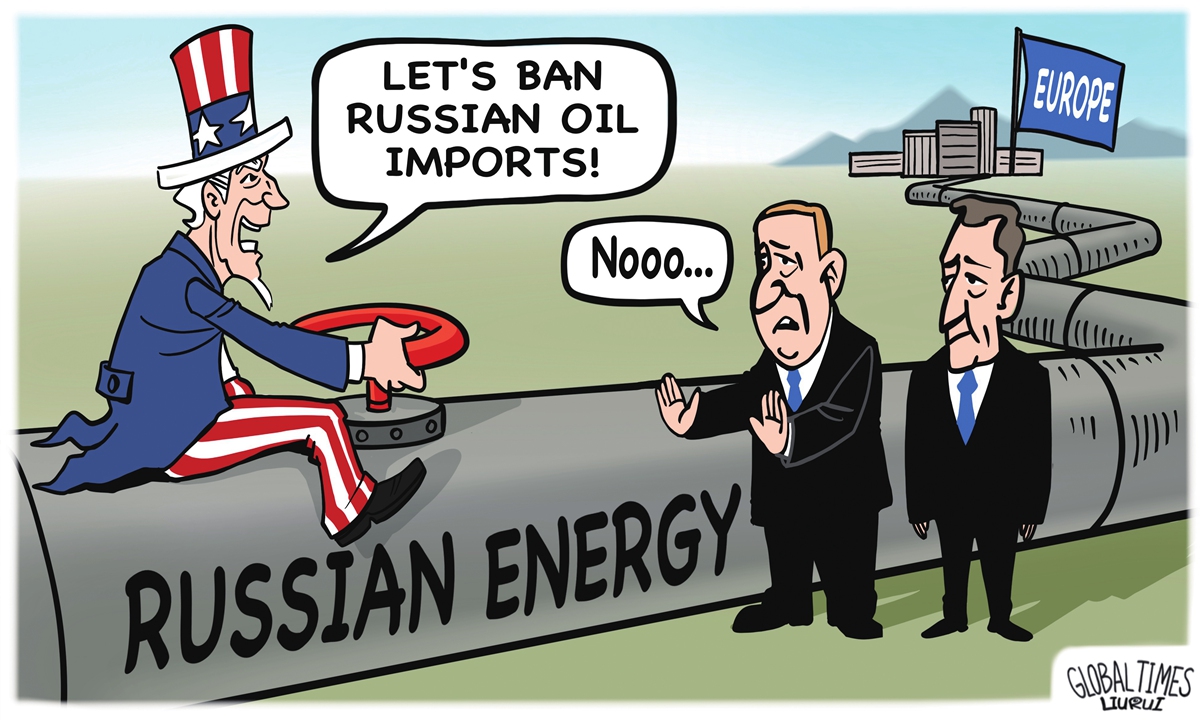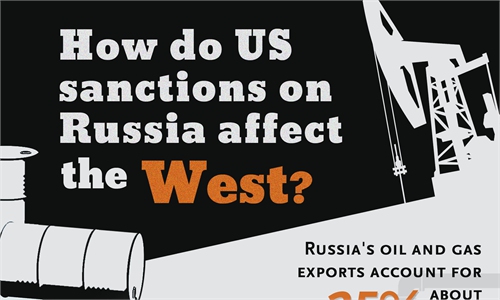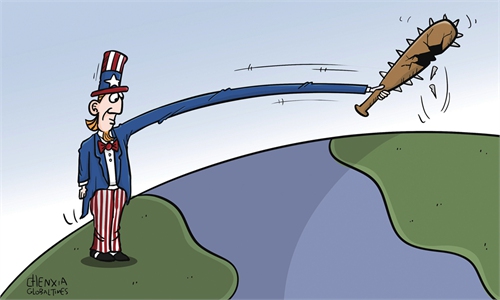
Contentious sanction Illustration: Liu Rui/GT
US National Security Adviser Jake Sullivan on Sunday warned Beijing it would "absolutely" face consequences if it helped Moscow evade sweeping sanctions over the conflict in Ukraine. The US will not allow a "lifeline to Russia from these economic sanctions from any country, anywhere in the world."
The next day, Reuters quoted two Indian officials as reporting that India is considering taking up a Russian offer to buy its crude oil and other commodities at discounted prices with payment via a rupee-rouble transaction, amid tough Western sanctions on Russia over its invasion of Ukraine.
The US sanctions seem to be majestic-looking and have many supporters. But the truth is, many of these US followers have been influenced by the US and its media.
The US ended all Russian energy imports last week, yet the EU found it difficult to cut ties with Russian fossil fuel supplies. Last Thursday, the European Commission President Ursula von der Leyen proposed 2027 as a firm end date to cut Russian energy dependence, which means the EU needs more time to adjust its energy industry and is not willing to blindly follow the Russian energy ban.
Von der Leyen is a pro-US politician in Europe. German internal opposition to US energy sanctions against Russia is strong. However, the opposition has no opportunity to speak out in such a political climate. The US is fabricating a sense of "political correctness" and the illusion that everyone is following.
Prior to Von der Leyen's proposal, the White House unsuccessfully tried to arrange calls between President Biden and leaders of Saudi Arabia and the United Arab Emirates, as the US was working to contain a surge in oil prices. Instead, Saudi Arabia reaffirmed its commitment to an OPEC+ agreement with Russia earlier this month. OPEC countries are not willing to be tied to the US or to break the production commitment and sticking a knife in Russia's back amid crisis.
In desperation, the US has to seek help from Iran by hinting to possibly import oil from Iran once a nuclear deal is reached. Senior US officials met with Venezuelan President Nicolás Maduro in Caracas, exploring the idea of easing sanctions to allow US companies to invest again in Venezuela's oil sector and help raise the country's production. This is the first trip by a White House official to Venezuela since 1999, when its late president Hugo Chavez took office. The opportunistic attitude shown by the US' significant swing in policy toward Venezuela is a sign of great immaturity.
This year is the 52nd anniversary of Biden's political career, but it is a very ironic situation that he, a veteran in politics, has shown complete naivete and clumsiness in events such as the withdrawal of US troops from Afghanistan and the Russia-Ukraine conflict. He is locked in an information cocoon, woven by his aides including Anthony Blinken and Jake Sullivan, having no perspective on the big picture.
Judging from Biden's remarks at home, he is aware that the US' so-called system of democracy is under internal and external threats. He needs to do everything he can to attribute all conflicts to ideological collisions. He believes doing so can help strengthen solidarity at home and with allies. But he forgets that the fundamental drivers of politics are interests.
What Washington is doing today is very irresponsible to its allies and partners. Its sanctions against Russia are more like sanctions against Germany. Although the US sanctions against Russia may generate momentum in the short term, they cannot be sustainable.
Not only will the current transatlantic alliance against Russia frustrate Europe, it will be resisted by other countries. Biden seems to have solidified Europe to condemn Russia, but in fact, European countries are helplessly tied.
In such a context, the effect of US sanctions against Russia is limited. The US has maliciously provoked a political conflict between Russia and Ukraine, escalating it into an armed one. This forces other countries to stand in line with the US.
The author is a research fellow at the Chinese Academy of Social Sciences. opinion@globaltimes.com.cn


